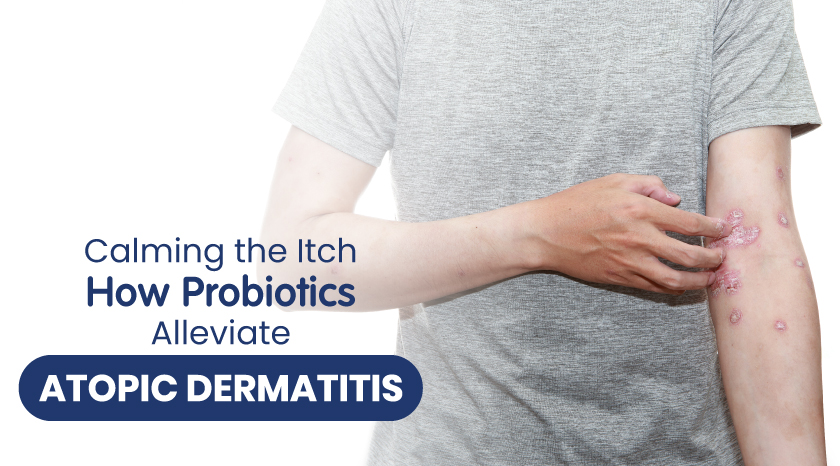Atopic dermatitis, commonly known as eczema, is a chronic inflammatory skin condition that affects millions of people worldwide, often causing discomfort, itching, and frustration. While treatments vary, emerging research suggests that relief may be found in an unexpected source: probiotics. These beneficial microorganisms, renowned for their gut health benefits, have been increasingly recognized for their potential to soothe the symptoms of atopic dermatitis. Let’s explore how probiotics offer a ray of hope for those battling this challenging skin condition.
Understanding Atopic Dermatitis:
Before we delve into the role of probiotics, it’s crucial to understand the nature of atopic dermatitis. This inflammatory skin condition is characterized by dry, itchy, and inflamed patches of skin, often accompanied by redness, swelling, and sometimes oozing or crusting. Atopic dermatitis is believed to result from a combination of genetic, environmental, and immune factors, with disruptions in the skin barrier and dysregulated immune responses playing central roles.
Restoring Microbial Balance:
The human skin is home to a diverse array of microorganisms, collectively known as the skin microbiota. Disruptions in this delicate microbial balance can exacerbate inflammatory skin conditions like atopic dermatitis. Probiotics, when applied topically or consumed orally, have the potential to restore microbial diversity, suppress the growth of harmful bacteria, and promote the proliferation of beneficial strains. This rebalancing act is key to calming the inflammation and irritation associated with atopic dermatitis.
Strengthening the Skin Barrier:
One of the hallmark features of atopic dermatitis is a compromised skin barrier, which allows moisture to escape and irritants to penetrate more easily. Probiotics have been shown to reinforce the skin barrier by enhancing the production of ceramides, fatty acids, and other lipids that help seal in moisture and protect against external aggressors. By fortifying the skin barrier, probiotics help restore hydration and reduce the risk of flare-ups.
Modulating Immune Responses:
In addition to their effects on the skin barrier, probiotics exert immunomodulatory effects that can benefit individuals with atopic dermatitis. By modulating immune responses and reducing inflammation, probiotics help dial down the exaggerated immune reactions that characterize this condition. This can lead to a decrease in the severity and frequency of flare-ups, providing much-needed relief for those living with atopic dermatitis.
Clinical Evidence:
Numerous clinical studies have explored the efficacy of probiotics in managing atopic dermatitis, with promising results. Research has shown that both topical application and oral supplementation of probiotics can lead to improvements in symptom severity, skin hydration, and quality of life for individuals with atopic dermatitis. While more research is needed to elucidate the optimal strains, dosages, and treatment regimens, the existing evidence underscores the potential of probiotics as a safe and effective adjunct therapy for this challenging condition.
Atopic dermatitis can be a frustrating and debilitating condition, but there is hope on the horizon. Probiotics offer a natural and potentially effective approach to managing the symptoms of atopic dermatitis by restoring microbial balance, strengthening the skin barrier, and modulating immune responses. Whether applied topically or consumed orally, probiotics hold promise for providing relief and improving the quality of life for those affected by this chronic skin condition.
As with any treatment approach, it’s important to consult with a healthcare professional before incorporating probiotics into your skincare regimen or dietary routine, especially if you have underlying health conditions or are pregnant or breastfeeding. With the right guidance and informed choices, probiotics can be a valuable ally in the ongoing battle against atopic dermatitis, helping to calm the itch and restore skin health and comfort.




